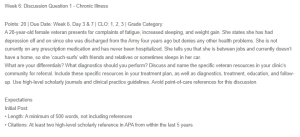Discussion – Comprehensive Care Plan for a Veteran with Fatigue and Depression
Differential Diagnoses
Hypothyroidism
Fatigue, weight gain, and increased sleep are indicative of an underactive thyroid. Hypothyroidism is to be expected among women and veterans in general, especially if the patient is exposed to toxins or has autoimmune predispositions.
Major Depressive Disorder (MDD)
Although the client has a history of depression, her symptoms suggest that depression may be the main concern, especially under stressful conditions of homelessness and financial instability. Depression is often characterized by persistent fatigue and disruption of sleep patterns, and her weight gain could be a result of reduced activity or eating, as suggested by Chand and Arif (2023).
Post-Traumatic Stress Disorder (PTSD)
Leaving aside the physical trauma, veterans are more likely to exhibit a heightened risk for PTSD from their traumatic experiences during military service. PTSD may be manifested as fatigue, depression, or sleep disturbances (Mann & Marwaha, 2023).
Obstructive Sleep Apnea (OSA)
While the client has not complained of snoring or daytime sleepiness, it would be a consideration, especially if her weight gain is considered significant. Poor quality sleep can contribute to increased fatigue and depression.
Anemia
The client may also be experiencing fatigue, which is a symptom of anaemia, especially if her nutrition is poor, which could be an issue since she had housing instability, as indicated by Turner et al. (2021).
Diagnostics
A detailed evaluation will be required to rule out other underlying conditions. TFTs are necessary for hypothyroidism, which is much more common and may present with symptoms of fatigue and weight gain. Furthermore, a CBC is also needed to rule out anaemia or another blood-related problem that could result in symptoms of tiredness. In the case of suspected sleep apnea, further testing with a sleep study may be ordered to exclude it. Other psychological screening instruments are depression using the PHQ-9 and PTSD using the PTSD checklist for DSM-5, as indicated by Roberts et al. (2021). A basic metabolic panel can reveal any metabolic conditions contributing to the symptoms.
Veteran Resources and Referral
As a veteran, the client could be referred to a myriad of specialized resources for multi-disciplinary considerations: primary care in the local VA system and specialized mental health care in the same system, including treatments for PTSD and depression. This would also include the Veterans Crisis Line when immediate support is necessary for crisis intervention. She is homeless and thus in need of housing and supportive services through the VA’s Homeless Veterans Program/HUD-VASH program. Employment service through the VA’s Vocational Rehabilitation and Employment would also help provide her with job placement, career counselling, and other services to get her back to work and stable again.
Treatment, Education, and Follow-up
If hypothyroidism is diagnosed, levothyroxine will be implemented to return the thyroid gland to a state of normal functioning. If this is depression, an SSRI such as sertraline will be initiated in addition to cognitive behavioral training that might help her regarding her mood and overall improvement, as indicated by Vasile (2020). Moreover, enlightenment on healthy dieting and exercise will aid her in maintaining weight and energy levels. She also requires referral to local resources regarding nutritional support, such as food banks. Follow-up in 4-6 weeks is also vital to assess response to treatment and ongoing monitoring for social services, housing, and employment support. The patient should also be referred to a social worker who may further coordinate access to veteran-specific resources.
References
Chand, S., & Arif, H. (2023). Depression. PubMed; StatPearls Publishing. https://www.ncbi.nlm.nih.gov/books/NBK430847/
Mann, S. K., & Marwaha, R. (2023). Posttraumatic stress disorder (PTSD). PubMed; StatPearls Publishing. https://www.ncbi.nlm.nih.gov/books/NBK559129/
Roberts, N. P., Kitchiner, N. J., Lewis, C. E., Downes, A. J., & Bisson, J. I. (2021). Psychometric properties of the PTSD checklist for DSM-5 in a sample of trauma exposed mental health service users. European Journal of Psychotraumatology, 12(1), 1863578. https://doi.org/10.1080/20008198.2020.1863578
Turner, J., Parsi, M., & Badireddy, M. (2021). Anemia. PubMed; StatPearls Publishing. https://pubmed.ncbi.nlm.nih.gov/29763170/
Vasile, C. (2020). CBT and medication in depression (Review). Experimental and Therapeutic Medicine, 20(4). https://doi.org/10.3892/etm.2020.9014
ORDER A PLAGIARISM-FREE PAPER HERE
We’ll write everything from scratch
Question
Week 6: Discussion Question 1 – Chronic Illness
Points: 20 | Due Date: Week 6, Day 3 & 7 | CLO: 1, 2, 3 | Grade Category:
A 28-year-old female veteran presents for complaints of fatigue, increased sleeping, and weight gain. She states she has had depression off and on since she was discharged from the Army four years ago but denies any other health problems. She is not currently on any prescription medication and has never been hospitalized. She tells you that she is between jobs and currently doesn’t have a home, so she ‘couch-surfs’ with friends and relatives or sometimes sleeps in her car.

Comprehensive Care Plan for a Veteran with Fatigue and Depression
What are your differentials? What diagnostics should you perform? Discuss and name the specific veteran resources in your clinic’s community for referral. Include these specific resources in your treatment plan, as well as diagnostics, treatment, education, and follow-up. Use high-level scholarly journals and clinical practice guidelines. Avoid point-of-care references for this discussion.
Expectations
Initial Post:
• Length: A minimum of 500 words, not including references
• Citations: At least two high-level scholarly reference in APA from within the last 5 years

